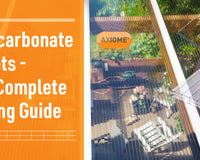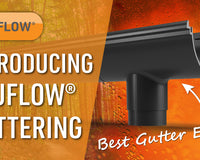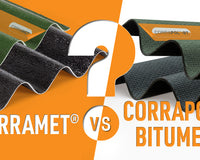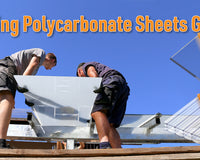Ever since plastic was invented in the early 1900s it has been increasingly improved as a material and used for building across the world. With hundreds of varieties of plastic, it is now a more popular product than alternatives and generally has greater availability.
Plastic sheeting has brought in increased safety, lower costs, and easier installation.
There are 4 main types of plastic sheeting:
Even today, the performance of modern plastics is still being continually developed and improved. Such as, Corramet sheeting which is a new corrugated plastic that was released in the 2010s. With its unique compound plastic resin, it is the strongest plastic corrugated sheet on the market and is just one example of innovation in the plastic sheet market recently. It is a solid corrugated plastic sheet meaning it is durable and long-lasting.
So, let’s get straight into the four types of plastic roof sheets below:
Multiwall Plastic Sheet
Multiwall plastic sheeting is the most common sheet available on the market due to its wide range of uses, longevity, and low cost price.
So, the sheet itself… Multiwall plastic is manufactured with an internal structure that has two outer walls and multiple thinner internal walls, which can sometimes look like a honeycomb. Having multiple internal walls is where Multiwall Plastic gets its name, the quantity of walls varying depending on thickness. The internal structure helps give the sheets good thermal qualities which can be used to retain heat and provide insulation. What’s more, the structure of the sheet makes it strong and lighter weight which allows it to span much considerable distances.
For example, you can now achieve up to 7 metre sheet lengths, and beyond, with these sheets due to improved manufacturing and capabilities. This is the longest length that can be achieved out of all the plastic sheet types.
Depending on the thickness and type of the sheet, there are going to be a different amount of walls within the sheet itself. For example, a Twin wall plastic sheet has two external walls and no internal walls. Twin wall Polycarbonate would be seen most commonly in 4mm, 6mm, and 10mm thicknesses. On the other hand, sheets that are greater than 10mm will have an internal structure and an increasing number of internal walls depending on thickness. Common multiwall polycarbonate thicknesses include 16mm, 25mm and 35mm.
4mm & 6mm Plastic: Greenhouse Plastic and Temporary Glazing
10mm Plastic: Thinnest roof sheet option
16mm Plastic: Most popular roof sheet option
25mm & 35mm Plastic: Best for insulation & strength
Multiwall sheets range from 4mm to 35mm which allows a big range of applications that these can be used for. For any roofing applications, it would be advisable to use no thinner than 10mm plastic as any thinner than this will be unstable and weak.
The most popular thickness is 16mm which has an excellent balance between strength and thickness. A 16mm polycarbonate sheet is durable enough for any weather conditions but also budget friendly.
The thickest multiwall plastic sheets, 25mm and 35mm, are used for ensuring the best insulation and soundproofing. For example, on conservatories, orangeries or other house extensions.

Solid Plastic Sheet
Solid Plastic is another flat sheeting option like multiwall however, these sheets are completely solid. The sheets themselves look like glass and most commonly are completely clear. The solid structure of the sheets makes them naturally stronger but there are varying strengths depending on the plastic type. Without a doubt, solid plastic is the ultimate type of clear plastic sheet.
Amongst all solid sheets, polycarbonate is the strongest solid plastic sheet material. Sheets like Axgard sheets have been manufactured a step further with a special polycarbonate resin which makes them virtually unbreakable. You can understand why this material has often been used for high impact applications such as security glazing and riot shields. Ultimately, this strength means that solid polycarbonate sheets are also great for DIY installations.
Where the most strength and impact resistance is required, Solid polycarbonate is the route to take. E.g. for school canopies, bike shelters, and greenhouses.
As the material is so strong, installation is much easier as polycarbonate sheets won’t shatter or break when you cut or drill them as is often found with other plastic sheet types, such as Acrylic sheets. Solid Plastic sheets should be installed with aluminium glazing bars to secure them in place. Thankfully, using glazing bars to install solid plastic is an easy and simple process.
Solid Plastic Roofing Sheets are produced in a selection of thicknesses ranging from 2mm to 12mm. Typically, 6mm is one of the most popular thickness choices of solid plastic but sheet plastics are used for a wide range of different projects so you are best to choose based on your specific requirements. For example, 3mm is great for secondary glazing and 8 or 10mm for bigger lean to roofs.
Corrugated Plastic Sheet
Corrugated plastic sheets are created from plastic that has been formed to make them ‘wavy’. The corrugations of the material add strength to the sheet thus meaning that a thinner material is used and essentially a simpler installation system.
There are two types of corrugated sheets: clear and solid, which we will go over below:
1. Clear Corrugated Plastic Sheet
There are three clear corrugated sheet types: GRP, PVC and Stormproof. Stormproof is the strongest clear plastic sheet and it is manufactured from a similar material to the virtually unbreakable solid plastic glazing sheets. It gets better though, Corrapol Stormproof has a UV protection layer to prevent any yellowing or brittleness over the years. Both these characteristics come together to offer a very long life span, superior strength and great weathering capabilities.
PVC Corrugated Sheets are the cheapest clear corrugated plastic but have a shorter lifespan and less strength.
2. Solid Corrugated Plastic Sheets:
Solid Corrugated Sheets are simply non-clear corrugated sheets that come in solid colours, such as black or green. Alternatives to coloured corrugated plastic have significant flaws, with corrugated metal rusting and corrugated bitumen having a limited lifespan. Due to the strength and rigidity of solid corrugated sheets, they are manufactured in lengths up to 4 metres. This makes waterproofing easier as you won’t have the overlap of sheets as many times down the length of a roof.
Manufactured from a specially formulated plastic compound resin, Corramet is the market-leading solid corrugated sheet. Corramet also comes with corrugated fixings, relieving you of the worry of making sure you buy enough screws or not. If more fixings are preferred for your sheets, then extras can be purchased to suit. Among other benefits such as being lightweight and easy to install, the corrugated plastic is easy to cut and can be compatible with all Corrapol flashings.
Plastic Mirror Sheet
Plastic Mirror sheet is a modern invention that provides a safe alternative to glass mirrors. There are huge benefits to using plastic mirrors as they are shatterproof and don’t crack like glass. This, meaning that it is a great material for security and safety applications. Mirrored sheets are often used as a safety mirror in hospitals, prisons and schools. Axgard-MSR Mirror Plastic Sheet also has a scratch-resistant surface.
Why is a plastic mirror a better solution? Primarily, due to its combination of being half the weight of a glass mirror (of the same thickness) and how easy it is to fix to walls. A plastic mirrored sheet has incredible longevity as it can withstand impact and won’t smash.
Safety is the key player in these sheets as they can be used in areas where there are pets or children and there is no risk of them getting harmed should anything impact the sheets. Glass mirrors are a hazard in areas of high risk or vandalism therefore, you should always choose a virtually unbreakable mirror to prevent any potential hazards.
A 6mm plastic mirror sheet is the most common and popular choice for all sizes of projects.
What type of plastic is best?
The most popular plastic sheet is a 16mm Polycarbonate Sheet due to its versatility and cost-effectiveness. As a rule of thumb here is a guide on the best sheet based on budget size:
Small Budget: Corrapol Corrugated Plastic
Medium Budget: Axiome Multiwall Polycarbonate
Large Budget: Axgard Solid Plastic
Plastic sheeting covers an extremely wide range of project needs making it one of the most attractive materials to use. For any outdoor DIY projects, corrugated plastic sheeting is a good option to go for, with the easy application of the product and the flexibility of the sheet. You don’t need to be a rocket scientist to install this, and the results are satisfyingly pleasing.
On the other hand, for trade uses or where covering an internal space, for example a conservatory, it is more suitable to use materials such as Multiwall or Twin wall which have greater longevity and strength.
Need Help with your Plastic Sheet Project?
If you are needing help building a quote for our plastic sheets please get in touch. Our Team will be happy to assist on our Live Chat or you can email shop@clearamber.com where our we will provide you with all the advice and support you require for your project.
Place Your Order Today – Get SWIFT Dedicated Delivery, Free Returns & Flexible Payment!














